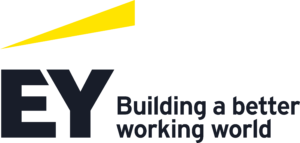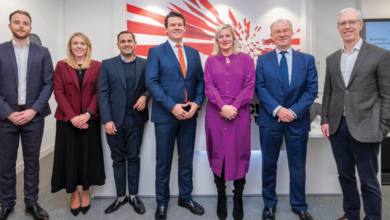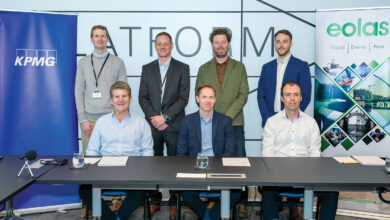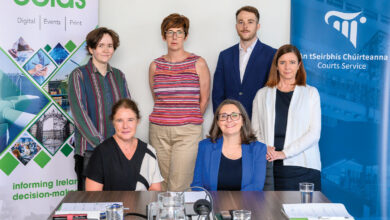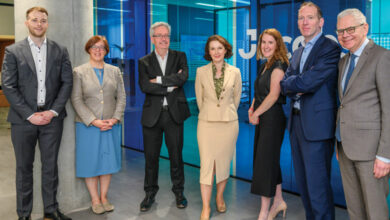Round table discussion: Transforming the future of public services through technology

EY Ireland hosted a virtual round table discussion with experts from across the public sector, applying their experience and insight to examine the transformation of public services through technology.
What are the key drivers of public service transformation?
Gary Comiskey
EY gets to look at this with an external lens and by working with multiple public bodies. There are four key drivers at the moment: digital development and the desire to better use technology to supply services back to the citizen; citizen expectations which were key to our work with the Department of Justice; value for money or doing things more efficiently and freeing up key people to do more value-adding tasks; and a push for sustainability, to drive the climate action agenda. Indeed, we’re beginning to see more organisations place a focus on sustainability. One example is the work we’re doing with Transport Infrastructure Ireland in relation to light rail infrastructure.
Finn de Brí
I would categorise the drivers as being efficiency and effectiveness demands. In the political arena, the public has a demand for particular products, for example, transport or healthcare. This precipitate efficiency demand, because if the budget isn’t increased to meet that demand, the key driver is optimisation of your budget. The effectiveness demand requires organisations to deliver better outcomes, changing the role of education, healthcare or the Oireachtas. You can bring about some of these changes with technology, but others aren’t technological. For instance, breaking down silos in organisations to move people towards a digital aggregation of services.
Yvonne Goff
One of the key things for the HSE is access to our services and the ability to meet demand. We have a finite capacity and while we are incrementally growing that capacity, the demand for our services is increasing. We have a record number of patients on our waiting lists, so we need to look at alternative and innovative ways to deliver our services which will include the use of emerging technology, from tele-messaging, virtual healthcare and patient portals, giving the patients information to look after themselves. Another consideration is trust and confidence in our service using open communication and by listening to the public. We need the technology to enable that. Our ability to be responsive to changing environments, especially in the pandemic, wouldn’t be possible without real-time data and an understanding of how incidence rates are moving, tracking and tracing and so forth. We are using the data and becoming an evidence-based organisation.
John Hogan
Coming from the Department of Finance, our drivers are centred around designing policy options and then the successful implementation of the policy choices, in line with the Programme for Government and our own strategy. We collaborate through innovation, simplification and the use of technology, not just within the Department but across the public sector, trying to deliver better experiences for users and at the same time improving data availability. We are very much a people-centred organisation and when we look at transformation, it’s hugely dependent on staff and their ability to do what we need them to do. This has emphasised the importance of learning and development and we have invested heavily in that to broaden the knowledge and skills base. As we have done so, we have had to find new and innovative ways to implement pandemic responses using mechanisms that we didn’t anticipate using, things like Revenue’s systems to disburse Government wage subsidy schemes. We all worked in collaboration to ensure that this happened at a pace that was not necessarily associated with the public sector, but given the situation it was necessary, proportionate and transformational.
Deirdre McDonnell
Data is a key driver for us, both in terms of our customers needing to update their own data but also in how we access that data at an aggregate level and feed it into policy. When you talk about agility, you see what the HSE has done in terms of Covid and that has been really impressive. The Department has internal and external customers and other stakeholders’ expectations. Efficiency is obviously a big issue and policy is a key driver in our area as well, in terms of translating it into implementation. That can have different effects, be it organisational change or rule changes that implement new schemes.
“We can get technology to do almost anything. Engineering is the easy bit. More challenging is the change and transformation of people and organisations.”
— Finn de Brí, Chief Information Officer, Houses of the Oireachtas
How far into the transformation journey are public services in Ireland?
John Hogan
I see it as less of a journey because a journey has a fixed destination and a lot of what we’re doing is more of an evolution in how the public sector can and should operate. At times, that evolution could be better characterised as a revolution, perhaps no more so than in the last number of months. If I think of one major step change in how we operate and conduct business, it is the transition to remote working. Previously, that would have been marked by years of proposals, consultation and guidance. Yet, out of necessity, it happened overnight. That evolution will continue, perhaps in a different direction, as we move from predominantly working from home to a more blended experience. The challenge will be to find new ways through which we continue to develop teamwork, foster collaboration and encourage innovation in more imaginative structures.
Finn de Brí
Organisations develop over time, but at different rates and for different reasons. For that reason, the progress of transformation of the public sector as a whole is hard to define. That being said, the signs indicate that there is good progress right across the board. There is a set number of public sector organisations, such as Revenue, the Department of Social Protection, the Department of Agriculture and the Department of Education, that are galloping ahead, while others are less so. When I came into the Houses of the Oireachtas Service, the extent of IT was very rudimentary and, in many ways, in need of a lot of remediation. I have looked at parliaments right across the world and identified the same scenario. Within national parliaments there is an aversion to change and it’s difficult for them to move forward. If a new technology automates a process and it is apparent in the chamber, it will be on the news agenda the following day. People are rightfully concerned about that because a mistake could have a huge impact on a piece of legislation, for example. There are many reasons why organisations either have or haven’t moved forward.
Gary Comiskey
I agree that transformation is an ongoing process that isn’t necessarily defined by a destination. One thing I know for sure is that if you think you’ve completed transformation then you’re mistaken because new change is always required. Across the public sector, there are pockets in which we have seen significant advancement and there are others in which progress still needs to be made.
“From a transformation perspective, our journey has escalated enormously because of Covid-19 and subsequent investment.”
— Yvonne Goff, Director, Integrated Information Service and Scheduled Care Transformation Programme, HSE
Deirdre McDonnell
While people might imagine that transformation is a ‘big bang’ moment, in reality a lot of change is incremental. Many of the changes which have the most significant impact on the ground originate in relatively small projects. Simultaneously though, there are transformative milestones, such as the Digital Postbox or the measures implemented to mitigate Covid-19, some of which will be permanent. There are different layers of change and they’re each important.
Yvonne Goff
From a transformation perspective, our journey has escalated enormously because of Covid-19 and subsequent investment. For two years I had been building policy strategy to develop a chief data officer-type function within the HSE to ensure the HSE becomes an evidence-based organisation. One of the critical components was the delivery of a single consolidated data lake. While there was consensus that it was a great idea, there was no huge investment in terms of money, effort or people. However, since March 2020, this changed and we now have a fully automated data system with a data lake, consolidating around 80 different data sources within the HSE. This investment in data and insights has been transformational and hugely significant, especially from a cultural perspective. For example, our meetings are now opening with people thinking and talking data-first.
What are the most significant obstacles on this journey?
Deirdre McDonnell
Investment is essential. It costs money to simultaneously change and keep the show on the road. Building up your team is also important because there are different skillsets required, whether it’s project management or data migration. Projects need the right people with the right skills to deliver, especially if you’re working at speed. Simultaneously, you need leadership that wants and supports the change; without this the team won’t get through the difficult times. The technology available can pretty much do everything we need to do, so it’s about how you get it set up and working. Many projects we are working on involve a significant change management element rather than a significant technology challenge.
John Hogan
Post-pandemic, there will be a different approach and attitude to how we view investment. With any transformational project, it’s about how you get people to explain the benefit in the way that is accessible for policymakers and users. From the outset, we really need to be clear what the goal of a project is. The other thing that comes to the fore, as we try to get more citizens online, is data security. We must ensure that there is confidence in government systems being robust enough to protect data. In addition, given that we are expecting much more business and governance to be done online, we have to be mindful of inclusivity. We have to ensure that there is an opportunity for citizens to interact with a digital public service without discrimination by economic circumstances, age, disability, etc.
Finn de Brí
We can get technology to do almost anything. Engineering is the easy bit. More challenging is the change and transformation of people and organisations. When we talk about change, I’m thinking of the whole organisation. I don’t just see it as single pockets; it must be holistic. Having the right people and the right vision is the most important element. You can’t just say, “let’s do digital”, you have to understand where your organisation is going and why. The transformation for Revenue is different to the Oireachtas, which is different to the HSE. The strategies for each area are long-term. My area is probably five to eight years, but for the HSE it’s probably longer. The real obstacles then are people who don’t want to change. People don’t change for so many reasons, they might feel their job is under threat or that any change will precipitate a mistake which is attributed to them. To say people are lazy misrepresents the good nature of people, they are anxious and enthusiastic to change but they have reservations. It’s about creating that environment that allows them to change.
Yvonne Goff
The HSE is vast, complex and is digitally immature for a number of reasons. One of the reasons is that we have diversified our investments rather than selecting a small number of big projects for everyone to get behind. One of the challenges we have is procurement because we have an extra layer of DPER and peer review for anything that’s over €5 million and then it’s hard for people to not feel secure about investment if we don’t go with the large known vendors that typically take years to roll out. We need to foster a more agile approach to investing in technology. Open platforms and growing module by module. An additional change is that the public has an expectation that you buy technology and it works straight away, but typically there is a lot of customisation for us so we’re challenged with selling to our funders that we need to invest in releasing clinician time and in change management. We also need to invest in the skilling of subject matter experts who can translate the business needs into IT solutions, that’s very important.
Gary Comiskey
That ability to balance business as usual and transformation is so important. It’s very difficult to take a nurse or doctor off a ward to design a new IT solution but it’s necessary, otherwise the solution won’t be successful. The capability, skills and experience you need around change management are in short supply and there’s a real need to have that frontline expertise there. You need to be accessible as well, it’s not a one size-fits-all. You have to think about other cohorts of the community; some big businesses can probably leave market sections behind if they think it’s apt for them, but the public sector can’t. You can’t just say you don’t get healthcare if you don’t have a smartphone.
“Data is fundamental to decision-making. Traditionally, we might have relied on more static data sources but there is now momentum behind real-time alternatives.”
— Gary Comiskey, Government and Health Associate Partner, EY Ireland
How important is data when making decisions?
Yvonne Goff
We need the data to plan our organisation and to develop our policies as without it, we’re flying blind. We absolutely need to know what’s happening, where there are any problems or challenges and how to address them in a manner that is responsive and focused on continuous quality improvement. It’s a cycle and data is part of that cycle. We can’t understand our investments by measuring objectives against the subsequent impact without data. For the HSE, the value of data is enormous, and we’ve proved that through the IIS Covid dashboards. We use the data operationally to determine, for instance, that a particular testing centre in a particular county needs additional staff. Without it we could not respond in an agile way. It’s critical for us.
Deirdre McDonnell
Having accurate and consistent data is absolutely fundamental to our long-term planning. Much of the data that we use in the Department of Education informs forecasting, budgeting, planning and understanding what is happening in the wider education system as well as what we think is going to happen in coming decades. What the data tells, us in relation to learning outcomes or where additional school places are required, then determines our policy and investment priorities.
John Hogan
Data is crucial to how we operate in the Department of Finance. Many key economic data metrics are used to inform our budgetary process and all of our economic forecasting. Traditionally, we have relied upon data that we have either developed internally or data that is sourced from the CSO, the Central Bank and international sources like the European Commission and the OECD. However, in recent months we have begun to look at other sources of data to better understand what’s happening in the economy in real-time. For example, mobility data and payments data produced by the likes of Google and Revolut has been made available to us, enabling a better understanding of what is happening in the economy now as opposed to the traditional sources which have been subject to a time lag.
Gary Comiskey
Data is fundamental to decision-making. Traditionally, we might have relied on more static data sources but there is now momentum behind real-time alternatives such as payment information. This is exemplified by the volume of traffic recorded by the M50 toll; information that now acts as an economic indicator. My colleagues in EY have been working with the Department of the Taoiseach to construct a ‘vital signs’ dashboard for Ireland which incorporates key metrics such as transport figures and economic data. Meanwhile, my colleagues in the UK completed research which estimated that the value of NHS data alone is worth approximately £10 billion. If this value can be captured and harnessed, it can actually drive dividends for government, though obviously there are sensitivities that must be considered in relation to how that might work.
“With any transformational project, it’s about how you get people to explain the benefit in the way that is accessible for policymakers and users.”
— John Hogan, Assistant Secretary, Department of Finance
Finn de Brí
Data in the Houses of the Oireachtas Service is a different kettle of fish; it’s not numerics, value for money or revenue, but it is open data. Oireachtas data is about opening up what our members do for us in the chambers through the democratic process. To a large extent, there is an opacity as to what the Oireachtas delivers for citizens. However, when you go in there and see the remarkable work that they do on our behalf, any cynicism drops away. The transformation is to open that data up for citizens and for democracy, to show how the organisation works. Also, showcasing our members of parliament and what they do, will allow citizens to change their understanding of the Oireachtas as a pillar of the State. Suddenly, people can see exactly what is happening in Leinster House, without the mediation of a small number of journalists, and draw their own assessments of the work that members do for them, ultimately informing them at election time.
What are the transformative technologies that you are most excited about within your remit?
Finn de Brí
As a technologist, you could easily jump in and say AI is really important and that would be the fashionable thing to say. And while we will use AI to help with translation to Irish and automatic speech recognition [ASR] to capture debates, very often it’s the simple applications that excite me the most. Technology is such that the simplest application can offer the best value for the business and therefore can get you more excited than anything else, it doesn’t have to be a big blockbuster. For example, everyone loves the motor tax online application. They love Revenue’s online service too. Many of these applications are not complex; simple technology delivers real value for people.
Deirdre McDonnell
Anything that makes the lives of the team and customers easier is interesting to me. Collaborative tools are important for project work and facilitating remote teamwork. Everybody is a bit fatigued with online calls but anything we can leverage for online collaboration is great. I think we’re all interested in data analytics and what it can do. This doesn’t have to be a big bang but anything that improves how we access and use data; those are the interesting areas and there are some very exciting developments in that area.
“Projects need the right people with the right skills to deliver, especially if you’re working at speed. Simultaneously, you need leadership that wants and supports the change.”
— Deirdre McDonnell, Assistant Secretary, Department of Education
John Hogan
If we reflect on how far we’ve moved in the public sector over the last decade, away from paper towards the likes of EPQs and e-correspondence, without such tools it’s hard to think of how we would have managed to maintain business continuity through the pandemic if we hadn’t already begun to undertake this transition. Looking ahead, there are additional sources of data we can harvest to allow us to understand the data in real-time. There are other things happening that can offer real opportunities for transformation. The Financial Management Shared Service under the National Shared Services Office and similar large projects are difficult to implement and this one is taking a bit of time but it offers huge opportunities in terms of giving us ways in which we can improve and harness our payment processing and financial decision-making. There are two huge challenges facing us, one immediate and one more long-term. The first one is Brexit, how we’re going to use technology to deal with a fundamental change in our relationship with the UK, such as the smooth import of goods and services into Ireland. The other one is climate change. The sort of transformative technologies that we need to implement in order to deal with the challenge we have is both daunting and exciting in equal measure.
Gary Comiskey
There was a lot of time spent by people running around the departments with folders in their hands before EPQ was introduced and so those small things definitely shouldn’t be overlooked, bringing these technologies together is really important. The big one that really excites me is electronic health records. I’ve had my own recent experience with the health system and it never ceases to amaze me, the volume of time and paper used up, as well as the degree of effort required of the staff in order to compensate that. If I had a magic wand that would be my one thing; an integrated healthcare system where you can turn up anywhere and your records are there.
Participants
Finn de Brí
Finn de Brí is Chief Information Officer for the Houses of the Oireachtas, with responsibility for the Oireachtas Digital Transformation, which is a multiannual transformation, incorporating seven programmes of development and over 100 projects. Prior to this, Finn was head of taxes and customs software application development in the Office of the Revenue Commissioners. He holds a PhD in Information Systems from Trinity College Dublin where he researched and developed an eight-stage maturity model which describes and predicts how information systems in large government organisations develop over time.
Gary Comiskey
Gary Comiskey is responsible for EY’s Government and Health Consulting practice and leads a wide range of complex transformation projects across several clients. Gary has more than 20 years’ experience and has worked extensively with the health sector, government departments and state agencies. He supported the implementation of electronic health record solutions, the design and build of government shared service solutions and the development of business cases, strategies and operating models. He also served as a board member and member of the audit and risk committee for two state bodies.
Yvonne Goff
Having previously worked as the HSE’s Chief Clinical Information Officer, Yvonne Goff now works as Director of the Integrated Information Service and Scheduled Care Transformation Programme. She has more than 20 years’ experience in healthcare as well as significant experience in leading technology-enabled transformation programmes. She was recently awarded a fellowship of the Analytics Institute of Ireland at the 2020 Analytics and AI Awards for her contribution to the sector.
John Hogan
John Hogan is the Assistant Secretary General in the Department of Finance with responsibility for tax policy. As the lead official in the Department’s Tax Division, he is responsible for advising the Minister for Finance on the development of equitable, efficient and effective taxation policies. John is centrally involved in the annual Budget and Finance Bill process. He has held a number of positions in the Department of Finance throughout his career. He was previously Assistant Secretary General with responsibility for banking policy in the Financial Services Division and has served as the Financial Services Counsellor in the Permanent Representation of Ireland to the European Union as well as holding posts in a number of government departments. He is an executive coach.
Deirdre McDonnell
Deirdre McDonnell leads the Major Operations Division in the Department of Education. Her team leads on ICT services and shared services for the Department and wider education and training sector. Deirdre has held a number of senior management roles in the Department including the development of strategy, policy and legislation. Deirdre has a degree in public administration and a masters in strategic management and planning.
